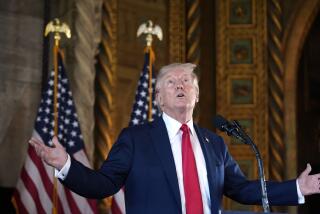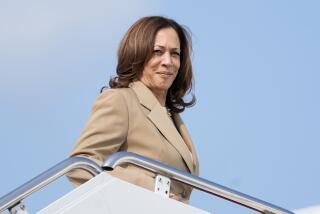Potomac primaries favor Obama
ARLINGTON, VA. — A new battleground looms in a state where picnickers still flock to venerated fields of Confederate glory. The campaigns of Hillary Rodham Clinton and Barack Obama are gearing up for today’s presidential primary in Virginia, a key Southern state rife with knotty demographics and shifting party loyalties.
Both camps view the Democratic vote in Virginia as their toughest matchup in the so-called Potomac primaries, a stretch of contests that also includes Maryland and the District of Columbia, where large and passionate constituencies among black voters and college students make Obama a heavy favorite.
Clinton aides have tried to dampen expectations, publicly stoking the prospect of an Obama sweep today. But strategic moves by both sides in recent days indicate that Virginia is positioned as Clinton’s likeliest target of opportunity.
Howard Wolfson, the Clinton campaign’s communications director, said Virginia was “a state along with Maryland and others in February where Sen. Obama has significant advantages. We have long factored that reality into our planning.”
Three Virginia polls released over the last few days, all putting Obama ahead of Clinton by at least 15 percentage points, gave credence to Wolfson’s caution. The latest, issued Sunday and conducted by Mason-Dixon Polling & Research, showed Obama leading Clinton 53% to 37%. In surveys last year, Clinton held double-digit leads.
Despite those bleak signs, the Clinton camp has quietly mobilized to exploit “some unique opportunities,” said Mo Elleithee, a national Clinton spokesman who was brought in to work on Virginia strategy. Even if Obama captures the popular vote in Virginia, Clinton aides say, Clinton hopes to carve off some delegates, who are chosen proportionately.
Clinton has rebounded with a surge of donations after she lent $5 million to her campaign treasury to make up for funding shortfalls. The New York senator’s campaign began ramping up media ads Friday on Virginia television stations.
Stressing her focus on the shaky national economy, the ads were a late comeback to Obama’s media blitz, which has dominated local airwaves since the middle of last week. And two days before her commercials began running, Clinton’s automated “robo-calls” were peppering Democratic households in northern Virginia, also echoing her economic emphasis.
Both candidates have appeared across the state over the last five days, as has Clinton’s main surrogate, former President Clinton.
Obama and Sen. Clinton also made separate speeches Saturday at the Democratic Party’s Jefferson-Jackson Dinner in Richmond. But Clinton was the first of the two rivals to appear in Virginia after last week’s Super Tuesday contests, speaking Thursday to 2,000 high school students at a rally in Arlington.
Her debut at Washington-Lee High School in Arlington was a bit rocky. She was more than two hours late, and when she finally arrived to her cheering crowd of fidgeting students, she was introduced by an excited host as “Hillary Rodham.”
Ignoring the apparent slip-up, Clinton worked her young audience like a talk-show host. She alternated stage whispers and hoarse exhortations, gently rebuking presumptive Republican nominee John McCain, “a friend of mine,” for “offering more of the same” in Iraq and on the economy.
She mentioned Obama as well, questioning the Illinois senator’s experience, asking who “would be the best president to start from Day 1?”
There was no talk of friendship with Obama, who is well positioned to win many of Maryland’s and the District of Columbia’s delegates.
Though the nation’s capital has a 56.5% black majority and Maryland’s 29.5% black population is slightly larger than that of South Carolina -- where Obama trounced Clinton last month -- Virginia’s 19.9% African American enclave is not as formidable politically. That forces Virginia Democrats to knit together seemingly incompatible coalitions to win primaries or general elections.
Gov. Tim Kaine and Sen. Jim Webb, both recent Democratic winners, broke Virginia’s long-standing GOP electoral hammerlock by relying on independents and a fragile patchwork of white and minority Democratic voters.
Independents will be allowed to vote with either party in Virginia’s primary. That could be a boon for Obama, who has scored well among independent voters in previous open primaries.
After former Massachusetts Gov. Mitt Romney’s withdrawal from the GOP race last week and McCain’s virtual anointment, some independents may feel more inclined to vote in the Democratic race, where they would have a greater effect.
For Clinton and Obama, “it’s a real balancing act to win here,” said Paul Goldman, a veteran Democratic political strategist who advised Kaine and Richmond Mayor L. Douglas Wilder. “They’re both coming in with their own natural constituencies. But the wild card this year is turnout. That makes it so hard to predict.”
Although Webb and some key Democrats remain neutral, Kaine and a solid cast of state senators and delegates endorsed Obama early on -- a marked contrast to Maryland, where Gov. Martin O’Malley and Sen. Barbara A. Mikulski and other top Democrats were working for Clinton.
Political veterans say Clinton’s best shot is to fuse city-dwelling Latino voters, government workers and retired military voters in northern Virginia and horse-country female voters in the southern part of the state.
“Virginia is much closer than Maryland is, in demographic terms, to the border and Southern states she carried last week,” said Thomas F. Schaller, a political science professor at the University of Maryland, Baltimore County, and author of “Whistling Past Dixie,” a book examining Democratic prospects in Southern states.
Along with independents, Obama’s choicest targets are black voters in Hampton Roads and Richmond, young professionals in northern Virginia, college students and white male “NASCAR Democrats” in coal country.
“The guy’s operation is pretty organized for an insurgent,” said Daniel Palazzolo, a University of Richmond political science professor. “I have no doubt their Virginia team is in full swing.”
Kevin Griffis, a spokesman for Obama’s Virginia campaign, said, “We just plugged into a grass-roots operation that was already up and running.”
Griffis noted that with little prodding from the national staff, Obama’s Virginia supporters amassed 20,000 signatures in November to put him on the ballot -- twice the number needed.
“That gave us a good idea of what we could build on,” he said.
More to Read
Get the L.A. Times Politics newsletter
Deeply reported insights into legislation, politics and policy from Sacramento, Washington and beyond. In your inbox three times per week.
You may occasionally receive promotional content from the Los Angeles Times.










